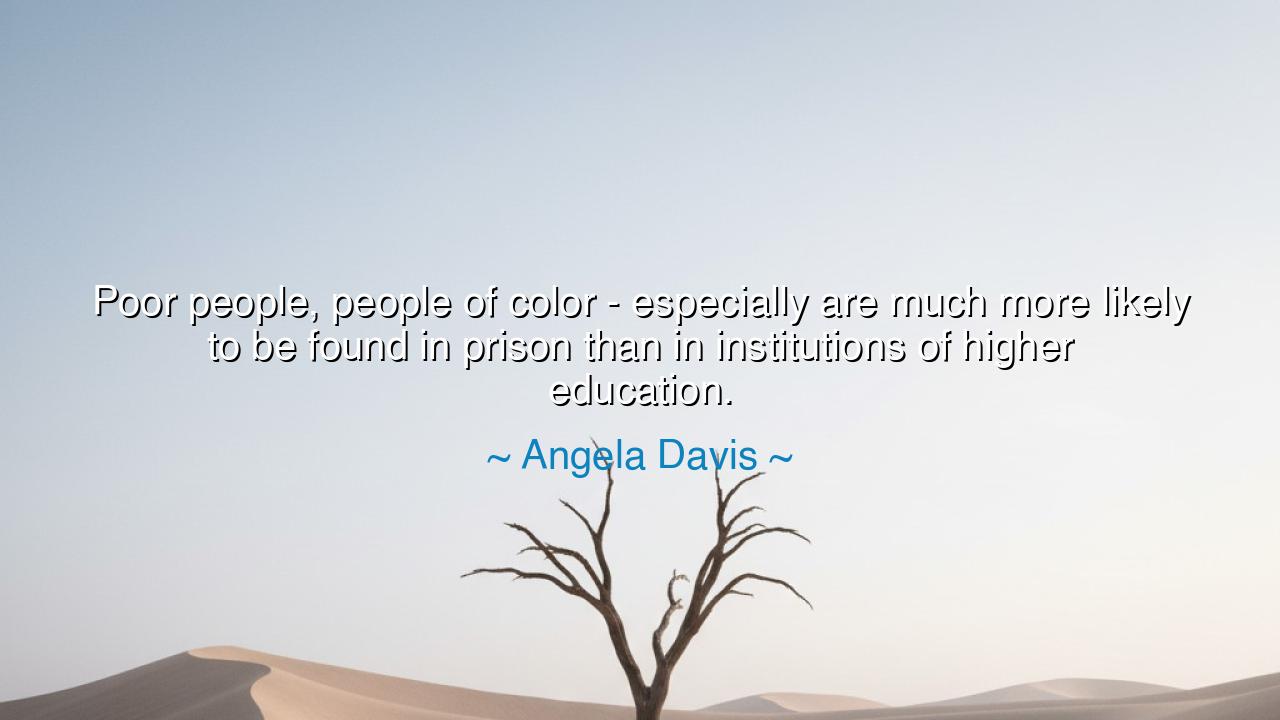
Poor people, people of color - especially are much more likely to
Poor people, people of color - especially are much more likely to be found in prison than in institutions of higher education.






Hear, O seekers of justice, the burning words of Angela Davis, scholar, activist, and voice of the oppressed: “Poor people, people of color—especially—are much more likely to be found in prison than in institutions of higher education.” These words are not spoken lightly, nor are they meant as passing observation. They are a cry from the heart of struggle, unveiling the deep injustices of a world where opportunity is denied to the many, and chains are given in place of books.
The origin of this utterance lies in Davis’s lifelong fight against systemic inequality. She saw with her own eyes how poverty and racial injustice combine to form barriers higher than any wall, and how the weight of society’s structures bends heavily upon the backs of the marginalized. For her, prisons are not simply places for those who have broken laws, but cages that capture the dreams of the poor, the disenfranchised, the forgotten. Against this darkness, she raised her voice to remind us that true education is not evenly offered, and that injustice still reigns where knowledge should liberate.
Consider, O listener, the story of the Reconstruction era after the Civil War. Freedmen, newly emancipated, sought education as the key to dignity and survival. Schools were built, teachers sacrificed, and young minds hungered for knowledge. Yet, within decades, Jim Crow laws rose, and instead of classrooms, many Black men and women found themselves ensnared in prisons, forced into labor once more. History itself proves Davis’s lament: society often closes the doors of learning to the poor and opens instead the gates of bondage.
Or look to the present, where the “school-to-prison pipeline” continues. Young people of color, too often denied resources, guidance, and fair opportunity, are punished more harshly, suspended more frequently, and pushed out of schools into streets where survival is perilous. Instead of college halls, they are herded toward cells. This is no accident, but the fruit of structures built over centuries, where poverty and prejudice interweave to form shackles invisible yet unyielding.
And yet, Davis’s words are not only condemnation, but a call to action. She reminds us that the measure of a society is found not in its prisons, but in its classrooms; not in the iron of its bars, but in the openness of its books. To shift the balance, to create a future where the poor and the marginalized are more likely to be students than prisoners, requires courage, vision, and collective will.
The lesson is plain: if we wish to honor humanity, we must labor for education over incarceration, for empowerment over punishment, for opportunity over despair. Let us build schools that welcome all, provide resources for the struggling, and create systems where justice is not blind to poverty or race, but sees clearly and seeks to heal. The power of learning must be offered freely, especially to those whom society has long denied.
Practical actions lie within reach. Support programs that mentor and uplift young people in marginalized communities. Advocate for reforms that dismantle discriminatory practices in schools and in the justice system. Invest in libraries, teachers, scholarships, and safe spaces where curiosity may thrive. And in your own life, extend a hand to those who hunger for knowledge but lack the means—be it through tutoring, supporting local schools, or simply affirming the dignity of every learner.
So let Davis’s words be carved in memory: when the poor and the oppressed are more likely to be found in prison than in higher education, the soul of a nation is in peril. But when we, with strength and love, break these chains and open the doors of learning, then we fulfill the true promise of humanity—that every soul, no matter how poor, no matter what color, may rise to its fullest light.






AAdministratorAdministrator
Welcome, honored guests. Please leave a comment, we will respond soon